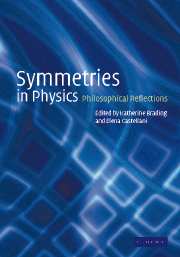Book contents
- Frontmatter
- Contents
- List of contributors
- Preface
- Copyright acknowledgements
- 1 Introduction
- Part I Continuous symmetries
- Part II Discrete symmetries
- Part III Symmetry breaking
- Part IV General interpretative issues
- 22 Classic texts: extracts from Wigner
- 23 Symmetry as a guide to superfluous theoretical structure
- 24 Notes on symmetries
- 25 Symmetry, objectivity, and design
- 26 Symmetry and equivalence
- Index
22 - Classic texts: extracts from Wigner
Published online by Cambridge University Press: 08 October 2009
- Frontmatter
- Contents
- List of contributors
- Preface
- Copyright acknowledgements
- 1 Introduction
- Part I Continuous symmetries
- Part II Discrete symmetries
- Part III Symmetry breaking
- Part IV General interpretative issues
- 22 Classic texts: extracts from Wigner
- 23 Symmetry as a guide to superfluous theoretical structure
- 24 Notes on symmetries
- 25 Symmetry, objectivity, and design
- 26 Symmetry and equivalence
- Index
Summary
Initial conditions, laws of nature, invariance
The world is very complicated and it is clearly impossible for the human mind to understand it completely. Man has therefore devised an artifice which permits the complicated nature of the world to be blamed on something which is called accidental and thus permits him to abstract a domain in which simple laws can be found. The complications are called initial conditions; the domain of regularities, laws of nature. Unnatural as such a division of the world's structure may appear from a very detached point of view, and probable though it is that the possibility of such a division has its own limits, the underlying abstraction is probably one of the most fruitful ones the human mind has made. It has made the natural sciences possible.
The possibility of abstracting laws of motion from the chaotic set of events that surround us is based on two circumstances. First, in many cases a set of initial conditions can be isolated which is not too large a set and, in spite of this, contains all the relevant conditions for the events on which one focuses one's attention….
However, the possibility of isolating the relevant initial conditions would not in itself make possible the discovery of laws of nature. It is, rather, also essential that, given the same essential initial conditions, the result will be the same no matter where and when we realize these.
- Type
- Chapter
- Information
- Symmetries in PhysicsPhilosophical Reflections, pp. 367 - 370Publisher: Cambridge University PressPrint publication year: 2003

